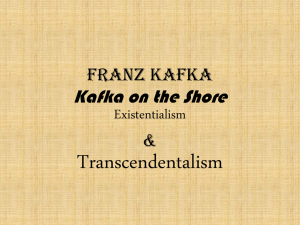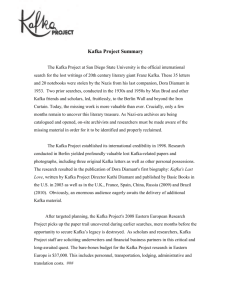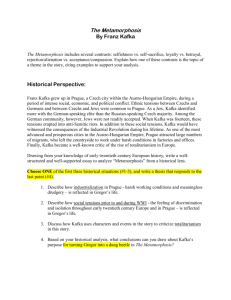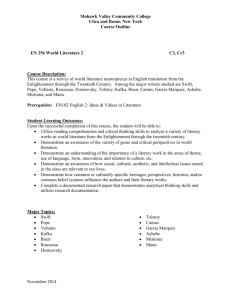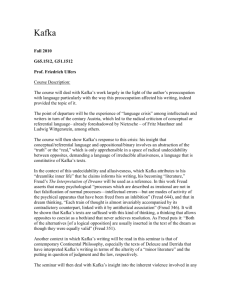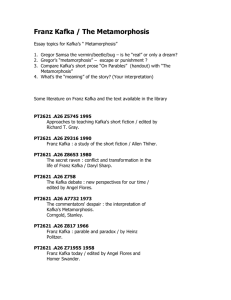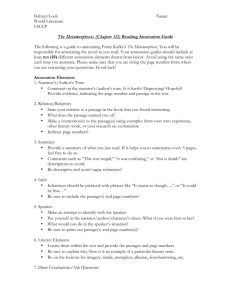Valentines with Franz Kafka and Dora Diamant
advertisement
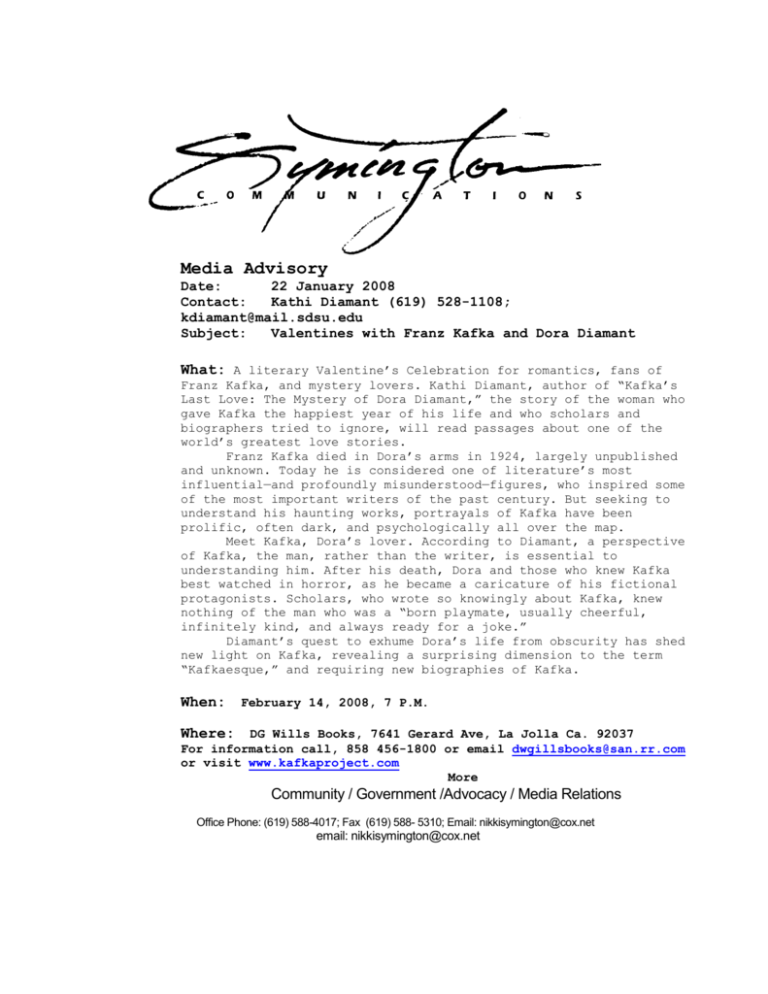
Media Advisory Date: 22 January 2008 Contact: Kathi Diamant (619) 528-1108; kdiamant@mail.sdsu.edu Subject: Valentines with Franz Kafka and Dora Diamant What: A literary Valentine’s Celebration for romantics, fans of Franz Kafka, and mystery lovers. Kathi Diamant, author of “Kafka’s Last Love: The Mystery of Dora Diamant,” the story of the woman who gave Kafka the happiest year of his life and who scholars and biographers tried to ignore, will read passages about one of the world’s greatest love stories. Franz Kafka died in Dora’s arms in 1924, largely unpublished and unknown. Today he is considered one of literature’s most influential—and profoundly misunderstood—figures, who inspired some of the most important writers of the past century. But seeking to understand his haunting works, portrayals of Kafka have been prolific, often dark, and psychologically all over the map. Meet Kafka, Dora’s lover. According to Diamant, a perspective of Kafka, the man, rather than the writer, is essential to understanding him. After his death, Dora and those who knew Kafka best watched in horror, as he became a caricature of his fictional protagonists. Scholars, who wrote so knowingly about Kafka, knew nothing of the man who was a “born playmate, usually cheerful, infinitely kind, and always ready for a joke.” Diamant’s quest to exhume Dora’s life from obscurity has shed new light on Kafka, revealing a surprising dimension to the term “Kafkaesque,” and requiring new biographies of Kafka. When: February 14, 2008, 7 P.M. Where: DG Wills Books, 7641 Gerard Ave, La Jolla Ca. 92037 For information call, 858 456-1800 or email dwgillsbooks@san.rr.com or visit www.kafkaproject.com More Community / Government /Advocacy / Media Relations Office Phone: (619) 588-4017; Fax (619) 588- 5310; Email: nikkisymington@cox.net email: nikkisymington@cox.net Footnote: The discovery that Kafka’s journals and letters written during his last year had been stolen from Dora by the Gestapo, and could be recovered, led Kathi Diamant to begin the Kafka Project and resulted in her award winning and internationally acclaimed book, “Kafka’s Last Love.” KPBS television personality and San Diego State University adjunct professor, Diamant is also director of the Kafka Project at SDSU, where the search for Kafka’s papers continues. Yet for Diamant, the full story has not yet been told, and finding the missing papers is part of Dora’s legacy. She is also inviting the public to join her in following Kafka and Dora’s footsteps to Prague, Krakow and Berlin, on a "Magical Mystery Literary History" tour before she embarks on the Kafka Project’s new Eastern European research in the summer of 2008. (See attached three fact sheets on “Kafka’s Last Love,” Kafka Project Eastern European Research and Magical Mystery Literary History Tour”) ### Page 2 Attachment 1 KAFKA PROJECT The Kafka Project is a non-profit international investigation under the auspices of the College of Arts and Letters at San Diego State University to recover the missing notebooks and letters of the literary genius Franz Kafka (1883-1924) confiscated by the Gestapo in Berlin, 1933. The results of the Berlin research in 1998 led to the publication of "Kafka's Last Love: The Mystery of Dora Diamant," by Kathi Diamant, and has necessitated new Kafka biographies, since all previous ones are now incorrect, based on the information uncovered by the Kafka Project about Kafka and Dora. LOCAL INTEREST: There is reason to hope that Diamant can find the missing literary treasure consisting of 35 letters and 20 notebooks. Following the Kafka Project's research project in Berlin 1998, and the publication of the resulting biography of Dora Diamant five years later, Kathi Diamant did indeed find lost Kafka letters. But it was not in Germany, France, Russia or elsewhere in Europe where other documents were found. In an amazing twist of fate, three original Kafka letters, ironically the only published letters that mentioned Dora were discovered in an attic in the San Diego suburb of Tierrasanta. They were recently sold at auction in Europe. Upcoming Eastern European Research Project: Poland, Czech Republic, July 1-30, 2008. Ten years after the successful first research project in Berlin, Kathi Diamant, director of the SDSU Kafka Project is returning to Eastern Europe for the summer of 2008, to follow up leads uncovered since her first four-month long investigation into the Nazi and Gestapo archives in 1998. Based on advice from German government archivists, the time has come to research new information concerning missing papers of Franz Kafka in Poland and the Czech Republic, as the German government is beginning to open previously closed archives of Holocaust-Era documents. The 2008 Kafka Project in Eastern Europe will be building on the 1998 Berlin research, as well as the newly uncovered results conducted by Kafka's literary executor and German scholars in the 1950s. The Kafka Project is a non-profit volunteer organization, made possible by grants, private donations and shared interest, knowledge and skills. Page 3 Attachment 2 MAGICAL MYSTERY LITERARY HISTORY TOUR, June 15-24, 2008 The SDSU Kafka Project is looking for participants to help solve a literary mystery, and be a part of literary history. To kick off the renewed research, the public is invited to join the Magical Mystery Literary History Tour to the Czech Republic, Poland and Germany, June 15-24, 2008. Led by Kafka Project Director and SDSU Adjunct Professor Kathi Diamant, the Magical Literary History Tour will follow Kafka and Dora's footsteps to Prague, Krakow and Berlin. The 10-day/8-night tour will celebrate the history and culture of these three legendary European cities, and will benefit the continued research into the missing writings of Franz Kafka. Special concerts, programs and events by artists and leading Kafka experts are also offered. Space is limited. To reserve, contact the Tour Director Corky Lang at corky.lang@gmail.com More information on the Kafka Project's "Magical Mystery Literary History Tour" is available at www.kafkaproject.com Attachment 3 THE BOOK: KAFKA'S LAST LOVE In this award-winning and gripping literary detective story, first published in 2003, Kathi Diamant brings to light the amazing woman who captured Kafka's heart and kept his literary flame alive. It was Dora Diamant, an independent spirit who persuaded Kafka to leave his parents and live with her in Berlin the year before he died. Although many blame her for burning many of his papers, at his request, she also held on to many other-papers that the Gestapo confiscated. The London Review of Books picked "Kafka's Last Love" for their Great Love Stories for February, and the book won the San Diego Book Association’s Geisel Award for the "Best of the Best" in 2004. In addition to the US (Basic Books, 2003) and UK (Vintage, Random House, 2004) editions, "Kafka's Last Love" has been translated into five languages, in France, Spain, China and next year in Brazil and Russia. Lauded by Booklist as "a demanding and heroic act of literary sleuthing" the review deems it a "captivating account" that "illuminates both Kafka's genius and Dora's joie de vivre. Kathi's reclaiming of Dora Diamant’s extraordinary spirit has brought many other treasures to light." More Page 4 Attachment 3 continued The London Evening Standard says it is "a vivid and coherent account. In telling her tale, Kathi Diamant has written a clear and absorbing book.” Dozens of positive reviews have appeared in the United Kingdom: (The Guardian, London Evening News, The Sunday Times, Literary Review, Sunday Herald, The Telegraph, The Independent, The Observer, New Statesman, TLS, The Scotland Herald, Irish Times, and more); in the United States:(New York Times, Publishers Weekly, Kirkus Review, Booklist, Library Journal, The Forward, Baltimore Jewish Times, San Diego Union Tribune, Houston Chronicle, St. Petersburg Times, Boston Globe, St Petersburg Times, and more), as well as in Argentina, India, Spain, France, Poland and even Albania! "Kafka's Last Love is alive with vivid, contradictory humanity. Diamant herself is a former journalist who writes colourful, journalistic prose…her writing is clear and gripping, her research prodigious.” Sunday Times ### Page 5
